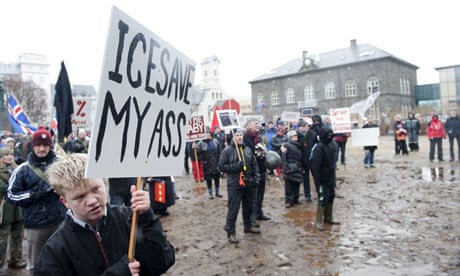This past weekend, the people of Iceland went to the polls in a referendum to vote on whether a deal should be passed to repay the British and Dutch governments for deposits lost in the Icesave online savings accounts when Iceland's Landsbanki collapsed.
As the international media flocked to Iceland in the lead-up to the referendum, the phrase "theatre of the absurd" occurred. There seemed to be a popular misconception that the referendum was about far more serious things than it actually was – such as whether Iceland planned to repay the Icesave debt at all. In fact, Icelandic authorities had already committed to repaying the minimum deposit amount for each Icesave online account – the deal being voted on in the referendum merely concerned the terms of the repayment.
However, what made the referendum – the first in the history of the Republic of Iceland – particularly bizarre was that there was already a deal on the table that was marginally better than the one being voted on. Confused? You're not alone.
Some background: at the end of last year, the Icelandic parliament – after nearly a year of bickering – finally passed a repayment deal arrived at through negotiations with British and Dutch authorities. The deal was highly unpopular with the Icelandic public and over a quarter of the electorate signed a petition urging the Icelandic president Ólafur Ragnar Grímsson to veto it. The president heeded the call, sending the Icesave bill to a referendum as stipulated by Icelandic law.
The government, eager to forestall the referendum, quickly invited British and Dutch negotiators back to the negotiating table. Following several days of intensive talks, the British and Dutch offered the Icelanders an improved deal over the one that the president had vetoed. Icelandic negotiators came back with a counter-offer, and talks were ongoing right up until the date of the referendum.
The referendum, on the other hand, still focused on the deal that the president had vetoed – naturally, since there was no other finalised deal on the table. However, it was clear to the Icelandic public that the UK and Netherlands were prepared to offer a better deal than the one being voted on. Hence it was highly unlikely that anyone was going to vote yes on a deal that was marginally worse than another that had since been proposed. The result was a foregone conclusion – it was only a matter of how many people would vote no. By late Sunday the results were in: 93.2% voted no, 1.8% voted yes, and 4.7% turned in an empty ballot, presumably in order to give their view of referendum's pointlessness. Invalid ballots were 0.3%.
Predictably, different factions are interpreting the results in line with their own agendas. Opponents of the Icesave deal – any Icesave deal – are claiming the big no as theirs, saying it sends a message that Icelandic taxpayers will not fork out money to repay the debts of a private bank, and that it will strengthen Iceland's negotiating position. Others point out that, in light of the improved proposal on the table, there were really only two options: no or no.
Meanwhile, members of the international press corps seemed slightly crestfallen to discover that the referendum wasn't really as monumental as some had thought. Calling the referendum a "farcical piece of political theatre", a reporter for the Financial Times suggested to the Icelandic National Broadcasting Service (RÚV) that the main item of interest was the fact that the Icelandic prime minister Jóhanna Sigurðardóttir had publicly announced that she was planning to shun the referendum. It seems an awfully long way to go, though, for a headline of that calibre.
